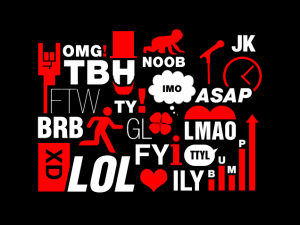Words are hard — I get it.
Speaking has always been difficult for me, so I understand why people want to make things easier for themselves and use idioms, shortcuts and other general wordplay to take the edge off of talking. Some things I do not understand, however, are “abbrevs.”
What are “abbrevs,” you may ask? They are the main elements of the phenomenon of shortening words to disturbingly cutesy phrases that are inserted way too often into daily speech. Examples of these abominations to the English language include “adorbs” (in place of “adorable”), “ridic” (ridiculous) and “delish” (instead of delicious).
Being relatively new to this disconcerting trend, I honestly did not realize how often these so-called “abbrevs” were used. They are all over the Internet; there is a website called www.abbrevs.org. True story. It has videos and discussions of abbrevs, even having a salutation line of “Welc.”
They also go as far as to include acronyms that are an entire alphabet long, translating to goodness-knows-what — but that is a whole other issue that I cannot bring myself to address. This website is ironically unfinished, thus becoming an abbrev of a website. Was this done on purpose? Who knows, but even I will admit that it is kind of amusing.
I even found an entire Facebook group dedicated to people who use abbrevs all day and every day, saying that those who do not are just “jeal” (jealous). Pages and pages of comments cover the group’s wall with people professing their loyalty to using these little phrases with quotations from their friends using words like “vom” (vomit) and “probs” (probably). There was even a component to the group called “Abbrev of the Week,” where the group would post their favorite abbreviated word for the week, definition of the word and a group signature of “Abbrevs, suckas! XOXO.” Classy, guys. Really.
I found that the group unfortunately did not keep up with the “Abbrev of the Week,” much to the outrage of the members. The group did, however, declare May 3 “National Abbrev Day” with hopes of trying to commemorate the holiday with a barbeque or a flag. Members made sure that they “def made it hap.” Good for them. I am truly upset that I missed the observance of this celebration. Maybe next year, guys…
Riddle me this: does it take that much more effort to say the entire word instead of abbreviating it? And, to take it one step further, why must people use not one, but two abbrevs in the same sentence? If I had a nickel for every time I heard someone tell me that their outfit is “totes profesh,” I would be much richer than I am now. I have even heard people standing by the Danforth salad bar go as far as saying “This sal looks totes delish.” Is “salad” really that hard to say? I mean, the two-syllables sometimes leave me tongue-tied but I thought that was just me.
Some of the abbreviations are worse than others. I can tolerate “totes” (totally), put up with “fabu” (fabulous — I will shamefully admit that I am guilty of using this one occasion) but “brill” (for brilliant) is, simply put, a problem.
I find it funny that so many people use “brill” to talk about smart people while they themselves sound, well, silly. Have social networking methods like texting and talking via Facebook (whi
ch has been shortened to its own verb of “Facebooking”) really lulled us into such a state of laziness that even words like “vomit” are simply too difficult for us to say or type?
Even worse: what if you find a word that you just cannot make into an abbrev? That idea seems too difficult to even imagine. If this continues, I do not have faith in the perseverance of the English language.
When did this fad start? Who knows. When will it end? That is a question that only time and valley girls everywhere can answer. Until that time, abbrevs will probs be legit everywhere and cause a ton of drams.
Sokol is a member of
the class of 2013.




